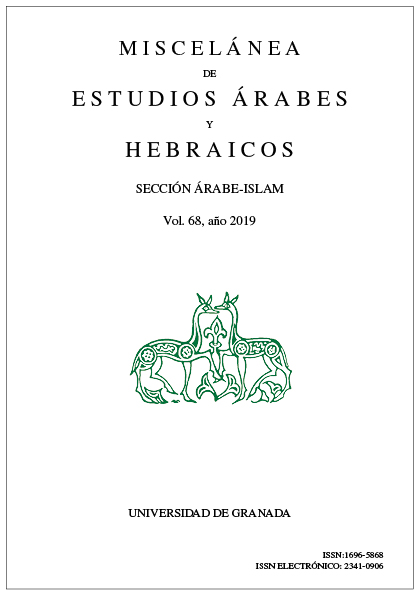Did Ibn Zamrak have an influence on García Lorca? The metaphor “hand of the breeze”
DOI:
https://doi.org/10.30827/meaharabe.v68i0.1025Keywords:
García Lorca, Ibn Zamrak, Comparative literature, Hand of the breezeAbstract
The metaphor “hand of the breeze” is not common in Spanish literature, although it was used by Federico García Lorca in his work Poemas sueltos of 1921. Writers like Juan Valera and Arabists like Pascual de Gayangos and Juan Vernet, when translating this metaphor, avoided mentioning “hand” and opted instead for other terms, such as “breath of the breeze”, “breeze of the breeze” or simply “morning breeze”, further confirming that this is a strange metaphor in the Spanish language. However, in 1859 the Arabist Lafuente Alcántara rendered the metaphor “hand of the breeze” literally into Spanish when translating a poem by the Andalusí Ibn Zamrak (14th century) that is inscribed on the walls of the Alhambra of Granada. Other Arabists, such as Simonet, Dozy and Dernburg, also translated the metaphor this way. This article is based on the hypothesis that Garcia Lorca, due to his great interest in the palatine city of the Alhambra, knew of this typically Andalusí metaphor and incorporated it into his poetic production.
Downloads
Downloads
Published
How to Cite
Issue
Section
License
The authors publishing their work in this journal agree to the following terms and conditions:
1. The authors retain the copyright and give the journal the right to be the first publication of the work and also to be licensee under a Creative Commons Attribution License which allows others to share the work, provided the author of the work and the initial publication in this journal are acknowledged.
2. Authors may make additional agreements separately for the non-exclusive distribution of the version of the work published in the journal (for example, putting it in an institutional repository or publishing it in a book), with acknowledgement of its initial publication in this journal.
3. Authors are allowed and encouraged to electronically disseminate (for example, in institutional repositories or on their own web page) the published version of their works (publisher's post-print version) or, if not possible, the author's reviewed and accepted post-print version. This is to facilitate productive exchanges, and allow for earlier and greater citation by third parties of the published works (See The Effect of Open Access).
4. The journal accepts no responsibility for the opinions expressed by the authors.















